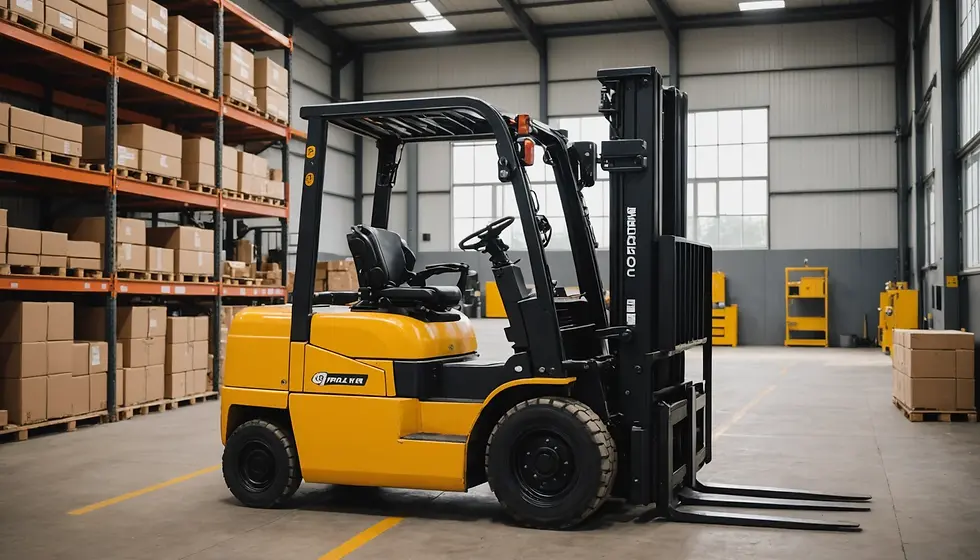Maximize Efficiency and Safety with Professional Lift Trucks Operation and Maintenance Training
- 20 ene 2025
- 3 Min. de lectura
Lift trucks, commonly known as forklifts, are vital in various sectors such as warehousing, manufacturing, and logistics. When managed effectively, they boost productivity and safeguard the well-being of operators and nearby workers. Therefore, having a solid training program is essential for reaping the full benefits of these machines.
Why Training Matters
Forklifts are powerful tools that require skilled operators to navigate crowded environments safely. Statistics show that around 20,000 forklift accidents occur each year in the U.S., leading to injuries and costly damages. Professional training is crucial for equipping employees with the skills needed to operate these machines safely and efficiently. Participants learn not only how to operate a lift truck but also the safety protocols that protect everyone in the workplace.
Program Overview
Essential Skills for Operation
Training programs begin with essential instruction. Operators learn the fundamental controls and functions of lift trucks, including:
Familiarity with machine controls
Effective maneuvering techniques
Safe loading and unloading practices
For instance, a trained operator can reduce incidents of dropped loads, effectively preventing costly product losses estimated at $52 billion annually in the U.S.
Focus on Safety Practices
Safety is crucial when dealing with heavy machinery. Training significantly lowers the risk of accidents by teaching critical safety protocols, including:
Correct use of personal protective equipment (PPE)
Situational awareness
Safe operation in various conditions
For example, operators trained in identifying hazards have been shown to reduce workplace injury rates by up to 25%. This preparation helps them confront real-world challenges confidently, enhancing overall job safety.
Maintenance Training: A Key Component
Preventive Maintenance Strategies
Beyond driving skills, lift truck training includes basic maintenance knowledge. Operators learn to conduct regular inspections and recognize signs of potential issues, crucial for prolonging equipment lifespan.
Key maintenance tasks include:
Performing pre-shift inspections
Spotting indicators of wear and damage
Sustaining cleanliness and functionality of machinery
This preventive maintenance not only saves on repair costs but can also reduce equipment downtime by as much as 15%, directly impacting productivity.
The Dual Benefit of Training Programs
When companies employ trained operators, they see improvements in both safety and efficiency. Fewer accidents lead to lower operational costs. For example, employers can save thousands in injury-related expenses. Proficient handling of forklift operations contributes to better productivity, with companies reporting efficiency gains of up to 30% post-training.

Who Should Enroll?
The training is well-suited for various employees who operate forklifts across different sectors, including:
Warehousing
Construction sites
Manufacturing facilities
Organizations aiming to boost their employees' skills find this training invaluable. Not only does it ensure compliance with safety regulations, but it also helps create a safer working environment.
Accessibility and Structure
Booking and Capacity
Training sessions are typically small, accommodating around eight participants. This setup promotes better learning experiences, allowing trainers to tailor their attention to each individual.

Participants can register for sessions online, providing flexible scheduling options for managers and staff alike.
Cost Transparency
Budget considerations are crucial for many businesses. Training costs are usually fixed, simplifying resource allocation for organizations. Knowing the investment upfront allows companies to manage training budgets without surprises.
Where and When?
Training sessions usually occur in specialized facilities designed for hands-on learning. This realistic setting helps reinforce practical skills.
Advance booking is typically required to ensure attendance, and cancellation policies are often in place to accommodate the dynamic needs of workplaces.
Final Thoughts
As industries increasingly prioritize safety and efficiency, professional lift truck operation and maintenance training is more important than ever. Comprehensive education on lift truck operation and safety practices can significantly enhance organizational performance.
By balancing practical operation skills with maintenance knowledge, companies maximize the efficiency of their lift trucks. Investing in this training fosters a culture of care and diligence, which ultimately leads to higher productivity and reduced accident-related costs.
Embracing professional training reflects a commitment to exceptional safety standards and responsibility in machinery operations. As companies refine their focus on safety and efficiency, the role of continued education will undoubtedly become even more significant, ensuring a safer and more effective work environment for all.


























Comentarios